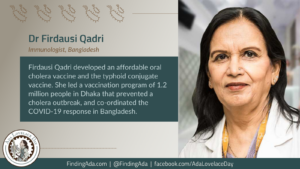
Dr Firdausi Qadri
Firdausi Qadri is a Bangladeshi immunologist and infectious disease researcher. She developed an affordable oral cholera vaccine and the typhoid conjugate vaccine. She gained her bachelor’s degree in biochemistry and her master’s degree in molecular biology at the University of Dhaka before moving to the UK to earn her doctorate from the University of Liverpool in 1980. Although she had the opportunity to stay in the UK, she felt she needed to return to Bangladesh.
She began working at the International Centre for Diarrhoeal Disease Research, Bangladesh (ICDDE,B) in 1988, starting her research on shigella, which causes dysentery, accidentally getting infected with Shigella dysenteriae herself.
She later refocused on cholera and typhoid, using biochemical, immunological and molecular approaches to understand the bacteria that cause these diseases and develop rapid diagnostic tools.
Qadri carried out a major trial with 240,000 people to explore the feasibility and effectiveness of a large-scale oral cholera vaccine. In 2017, when Rohingya refugees from Myanmar arrived in Dhaka, their camps were in areas with some of the highest rates of cholera in the city. She led a team of experts during a mass vaccination program which prevented a cholera outbreak, and was part of the vaccination of 1.2 million high-risk people in Dhaka.
In 2012, Qadri was awarded the Christophe Rodolfe Grand Prize. She used the prize money to found the Institute for Developing Science and Health Initiatives, which launched in 2014 and focuses on genetic disorders such as Down Syndrome, Huntington’s disease, and congenital hypothyroidism.
When the COVID-19 pandemic began in 2020, Qadri was one of the key scientists coordinating a response to the new virus.
In 2020, she received the L’Oréal-UNESCO For Women in Science International Award for Asia-Pacific “in recognition of her outstanding work to understand and prevent infectious diseases affecting children in developing countries, and promote early diagnosis and vaccination with global health impact”.
In 2021, Qadri was awarded the Raman Magsaysay Award for “her passion and lifelong devotion to the scientific profession; her vision of building the human and physical infrastructure that will benefit the coming generation of Bangladeshi scientists, women scientists in particular; and her untiring contributions to vaccine development, advanced biotechnological therapeutics and critical research that has been saving millions of precious lives.”
Further Reading
- Firdausi Qadri, Wikipedia
- List of Ramon Magsaysay Award winners, Wikipedia
- Why there aren’t enough female science professionals in Bangladesh, The Business Standard
- L’Oréal-UNESCO For Women in Science International Awards, Unesco, 2020
- Professor Firdausi Qadri, For Women in Science, 4 December 2020
- Firdausi Qadri: improving vaccines and diagnostic to ensure children live longer, healthier lives, UNESCO, 21 December 2020
- STEM education and careers — equal participation of girls & women, Laila Khondka, The Financial Express, 24 September 2021
- Firdausi Qadri: Battling pandemics through vaccines and research, Loreben Tuquero, Rappler, 21 October 2021
- Ramon Magsaysay Awardee Dr Firdausi Qadri on Her Fight Against Cholera and Typhoid, Franz Sorilla IV, Tatler Asia, 26 January 2022